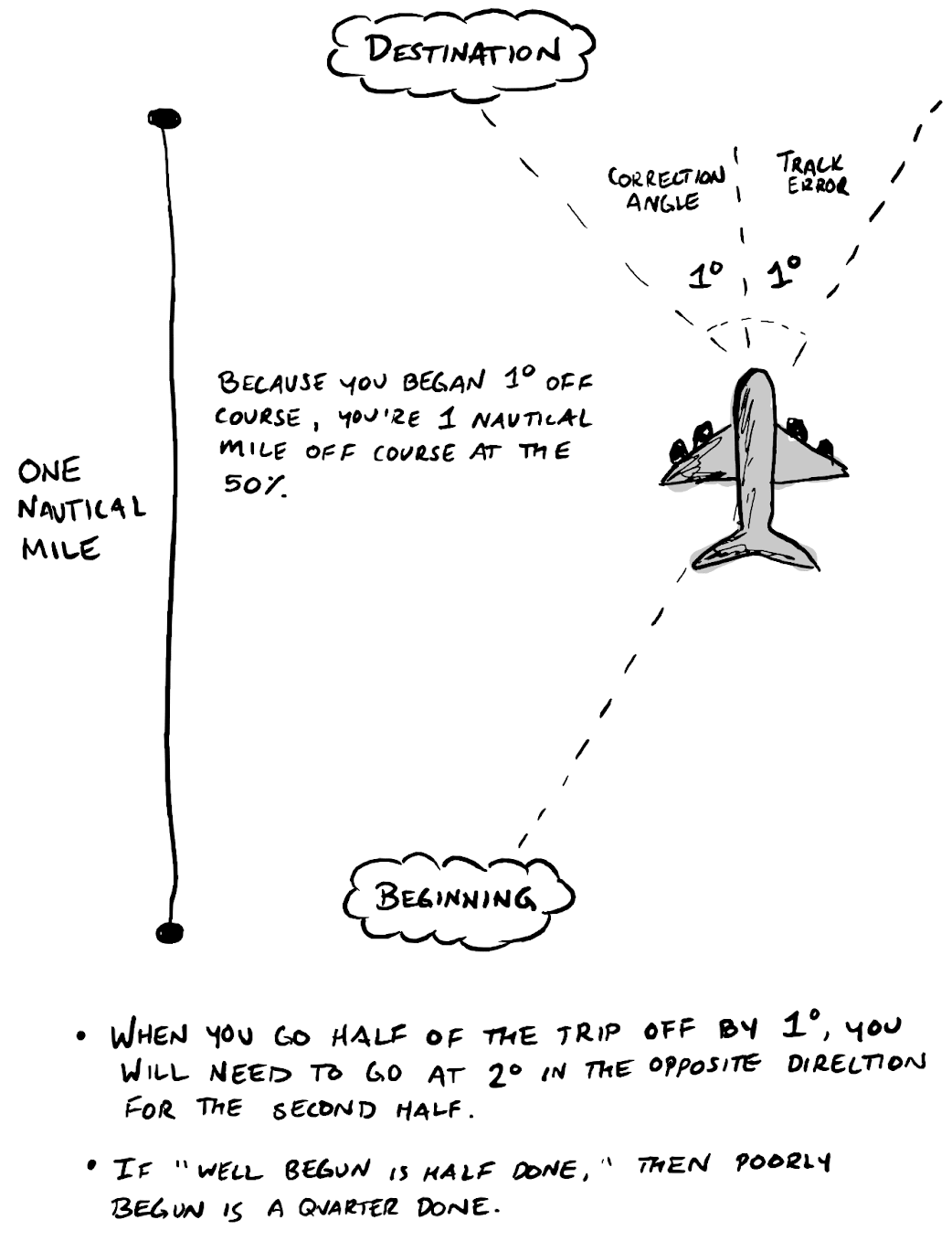Eating well is a part of living well.
If a pilot stays 1° off course for 60 miles, they'll end up 1 mile off course. All pilots learn this. It's called the 1 in 60 rule.

For the project of eating well, where, how, and why we're going matter equally. The image of an off-course airplane is a good one. Many hurry to lose weight, but few aim to make a character change. Everyone wishes to be well, few take the time to bring that wish to reality.
We've lost weight before. But we haven't yet become the sort of person who eats for the sake of their wellbeing. Wellbeing is the destination for everyone, but a one-degree turn is imperceptible when we're 35,000 feet above the ground. When we take up a diet to lose weight, we mean to aim at wellbeing, but we miss the mark.
Pursuing the right destination and keeping course is essential to everything we do. Wellbeing is the end goal and so our course leads to it. We may need to lose weight to be well, but that is only a means to the end goal. Forever and always the goal of life is to live well. All living things yearn to live and thus they share a self-preservation instinct. Humans are living things that not only wish to preserve life but to live it well.

That's why we want to lose weight. In the end, we want to be well. When we see the physique of Michelangelo's David, we don't see David. We see ourselves. We see what we could be.
Humans have many names. Homo Sapiens is one of them. It emphasizes the powers that make us what we are. Humans are creatures capable of considering, judging, and thinking. When something's doing well, it's often said that it's “being itself.” This is an otherwise confusing phrase. Of course, something is itself. But when something is unwell, we often say that “it doesn't look itself.” This implies that we can be closer or further from what we should be. Happiness might be as simple a thing as being what we are supposed to be. Maybe defining what we are is the more difficult task.

We are well when we human well. When we live life considerately, judiciously, and thinkingly. That's why we call someone a “good person.” More than holding doors open for people, a good person is good at personing. They're not only living life, but infusing their activity with consideration, judgment, and thought. Well-being implies that we're being well.
A good beginning starts at the end. If I plan to be in New York City, but I live in Barcelona, I will align all my plans with that end goal. New York will be last in the sequence of events, but first in intention. It's the sake for which I do everything else, even the smallest things like putting on my shoes or getting dressed.
It's easy to aim at the wrong end goal and even easier to slip off course even when aiming at the right thing. Whenever the pursuit of "results" overtakes the pursuit to be well, we've gone off course. Results are good, but they're too flimsy to bear the weight of life's purpose.
With all this said, I will attempt to define eating in sight of its ultimate goal. Eating well is the lifelong practice of eating food with the intent to bring about and continue our wellbeing.
Of course, this only gets us so far. We again have to determine what it means for a person to be well. As it is, eating well is only a facet of a happy human. All animals eat to preserve life, but humans must also eat to fulfill their life. Eating well is necessary for a good life, but incapable of making life good by itself. Eating well is in service to being well.
Eating well is descriptive, not prescriptive. Though the food eaten is important, the underlying reasons for which they're eaten are more important. We've heard it said that dieting is a "way of life" and a "lifestyle." Eating well means eating considerately, judiciously, and thoughtfully. Not only eating but eating in a particular way, compelled by principle and purpose.
We yearn to not only be but to be well. The human animal is well when they go about their animal needs considerately, judiciously, and thoughtfully. We ought to care less about rapidly losing weight and more about course correction.